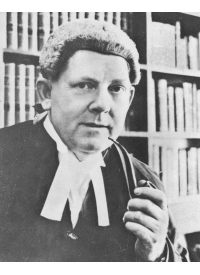Rear Admiral Trevor George Rapke

Trevor George Rapke was born on 2 September 1909 at Prahran, Melbourne, the second son of Polish born Abraham Rapke (tobacconist) and Julia Rapke (nee Levoi) a noted feminist and civil rights activist. He was raised at St Kilda, home of the city's Anglo-Jewish community. Trevor attended Wesley College and entered the University of Melbourne and graduated BA (1931) and LL B (1933). He also went to the St Kilda Hebrew School, attended Sabbath afternoon services, followed by higher Hebrew classes. This all formed the basis of his continuing interest and expertise in orthodox learning and culture. A senior member of the Judaean League, he remained committed to traditional Judaism and occasionally gave sermons to his orthodox congregation. He also passed on the Jewish faith through the children's services, which he helped to originate in 1924, and through the 3rd St Kilda Scout Group, which he formed to enable Jewish boys to engage in scouting in an appropriate religious context.
While adamantly opposed to a secularism that would submerge the Jewish identity, Rapke was a leader in replacing the Victorian Jewish Advisory Board with the lay Board of Deputies, of which he was president (1956-58). He disagreed with many of the beliefs of the liberal congregation, but kept in touch with its members and sometimes acted as a mediator in the interests of communal harmony. In 1957 he was appointed Australia's representative on the Jewish Congress' world executive and elected president of the World Israel Movement. He was also a long-term executive-member of the Zionist Federation of Australia and New Zealand.
Rapke was admitted to the Bar on 1 March 1935 and soon became a well-known criminal lawyer. He was appointed as a paymaster sub lieutenant, Royal Australian Naval Volunteer Reserve, on 19 January 1941 and promoted Lieutenant in April. His initial service was in the Victorian shore depots HMAS Lonsdale and HMAS Cerberus during January-March 1941 before heading north to Brisbane for duties at the shore depot HMAS Brisbane in mid-March 1941. Rapke served briefly at sea in the auxiliary minesweeper HMAS Tongkol in August 1941 before being appointed to the RAN shore depot HMAS Melville, in Darwin, in late August 1941. He was present during the first air raid on Darwin which occurred on 19 February 1942.
In late March 1942, Rapke, while still serving at Melville, was flown at short notice, to the New Hebrides (Vanuatu), to join the cruiser HMAS Australia to represent two stokers charged with the murder of Stoker John Joseph Riley on 12 March 1942. In choosing Rapke to represent the two accused men the Secretary to the First Naval Member stated "I think Paymaster Lieutenant Rapke, now at Darwin, is the best available. Rapke in civil life is a criminal lawyer of good standing, who conducted the defence in an important case not long ago...I would be quite satisfied to have Rapke as my legal advisor if I found myself in trouble".
The Commanding Officer of Australia, Captain Harold Farncomb, clashed with Rapke during the ensuing court martial over a number of points of law. Farncomb, however, was so impressed by Rapke’s skill and fearless determination, to provide the best possible defence for the two accused men, that on conclusion of the trial he offered Rapke the job of being his secretary which Rapke accepted. The two accused stokers were found guilty of murder but were given gaol sentences instead of the mandatory death sentence.
While serving in Australia, during 1942-43, Rapke saw action during the battle of the Coral Sea, in May 1942, and the Solomon Islands campaign later that year. Lieutenant Rapke returned to Cerberus in May 1943 and later served in Lonsdale for legal duties. His naval appointment was terminated on 22 April 1944, due to ill health, and Rapke returned to his private practice. At the Synagogue, St Kilda, on 17 June 1947 he married 19-year-old Betty Ellinson.
In April 1958 Rapke became a Queens Counsel and it was also claimed that he was the first member of the Jewish faith to become a judge in Victoria when he was elevated to the bench of the County Court in November 1958. As a judge, he was outspoken and earthy, showing great concern for community welfare, civil liberties and just sentencing. The sharp distinction he drew between offences against property and those involving violence brought him into conflict with some Victorian Government ministers. He publicly condemned illegal discipline at Pentridge prison, procedures in trials for rape, and the practice of keeping juveniles in custody for long periods while awaiting trial. Prepared to make his views known to the press, he antagonised some members of the judiciary by criticising their remoteness from society. He was often described as "colourful, strong, fair and fearless".
On 7 May 1964 Rapke was appointed as the Judge Advocate-General, Australian Naval Forces with the honorary rank of Rear Admiral holding this position until his death. In 1971 the Federal Government chose him to investigate allegations of 'bastardisation' at the junior recruit training establishment, HMAS Leeuwin, at Fremantle in Western Australia. Some believed that his close links with the RAN would compromise his impartiality, but his report was characteristically judicious and his recommendations were consistent with the humane principles he employed on the bench.
Rapke was also a Freemason, president of the Athenaeum Club (1956-57) and honorary professor of law (1965) at the United States Naval Justice School, Rhode Island. Late in 1977 he was notified that he was to be appointed an Officer in the Order of Australia (AO) in the 1978 Australia Day Honours List. However Rapke died of complications arising from a coronary occlusion on 21 January 1978 and the award was posthumously granted.
Rear Admiral Rapke was buried in Springvale Cemetery, Victoria. His wife, and their four sons and two daughters survived him.


